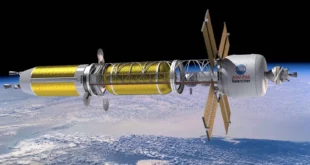
On 6 April 2020, US President Donald J. Trump signed an Executive Order (EO) on Encouraging International Support for the Recovery and Use of Space Resources. This order addresses US policy regarding the recovery and use of resources in outer space, including the Moon and other celestial bodies. SpaceWatch.Global was able to interview Dr. Scott Pace, Deputy Assistant to the President and Executive Secretary of the U.S. National Space Council, and ask him to provide the context for, and more detail on, the Executive Order. The full interview with Dr. Pace will be published in a forthcoming e-Brief on space resources that is forthcoming.
Can you explain the genesis of the executive order?
Based on Space Policy Directive 1 (SPD-1) calling for a sustainable program with commercial and international partners, Artemis plans for in situ resource utilization (ISRU) on the Moon and the expected need for ISRU on Mars. The U.S. government alone won’t be doing everything, so we need an international environment that supports private sector activities in ISRU and related services. With the preceding announcement of NASA’s plan on sustainability of lunar surface activities, we have a particular scenario for using non-terrestrial resources. Combined with SPD-1, we are looking toward engagement with commercial and international partners. As part of that process, it was important to clarify what U.S. policy was toward the Moon Agreement and then lay out a positive vision going forward.
Can you provide some background or context as to the timing of the EO’s release?
This has been in work for quite some time. We began development last year and had hoped to release before the United Nations Committee on the Peaceful Uses of Outer Space (COPUOS) Legal Subcommittee meeting so as to discuss more widely. And then we were looking at the June plenary meeting of COPUOS. Unfortunately, the pandemic postponed the meetings, so we decided to move ahead anyway in conjunction with NASA’s release of its plan for sustained lunar surface operations.
Did space resources/mining companies contribute to the thinking behind, and language in, the EO?
The ideas in the EO have been around a long time, going back to the initial debates over the 1979 Moon Agreement. This has been a recognized issue among advocates for space development, going back many decades. But the development of the private space sector, including real attempts at asteroid mining, as well as Artemis, made the time ripe for a clear statement of national policy.
Please explain the U.S. policy rationale for why space is not a ‘global commons’.
Some view all shared domains beyond national sovereign jurisdiction and control as constituting a “global commons.” However, this does not have a firm foundation in international space law, given that the concept of a “global commons” is not part of the Outer Space Treaty. Outer space is a legally and physically unique domain of human activity. Nevertheless, in seeking international support, the United States may draw on legal precedents and examples from other domains to promote the recovery and use of space resources.
Is the U.S. already in discussions with other countries on space resources cooperation, and how confident are you of international support?
Only informally, as has occurred in groups such as the Hague International Space Resources Governance Working Group, which American subject matter experts and industry representatives participated in and as part of our regular consultations with friends and allies. But from those preliminary discussions, I am confident there are supporters and others who are waiting to see what develops before committing.

Dr. Scott Pace is Deputy Assistant to the President and Executive Secretary of the U.S. National Space Council. The Council is chaired by Vice President Michael R. Pence. He began this position in August 2017.
Dr. Pace was formerly the Director of the Space Policy Institute and a Professor of the Practice of International Affairs at George Washington University’s Elliott School of International Affairs from 2008-2017. From 2005-2008, he served as the Associate Administrator for Program Analysis and Evaluation at NASA. Prior to NASA, Dr. Pace was the Assistant Director for Space and Aeronautics in the White House Office of Science and Technology Policy (OSTP).
Dr. Scott Pace was also a member of the SpaceWatch.Global Advisory Board prior to his appointment to the U.S. National Space Council.
 SpaceWatch.Global An independent perspective on space
SpaceWatch.Global An independent perspective on space




